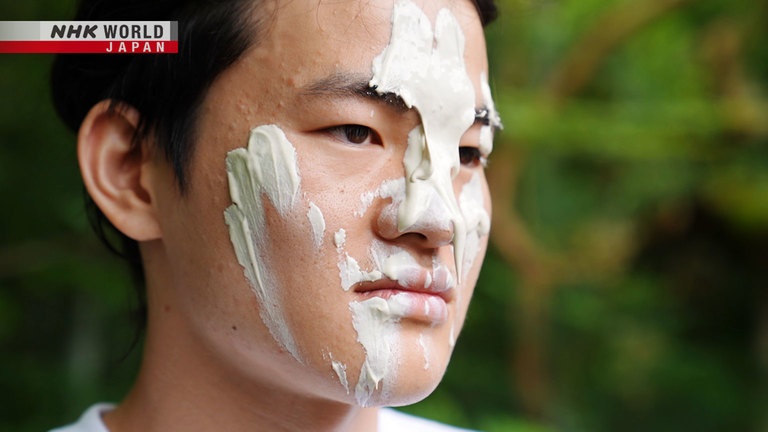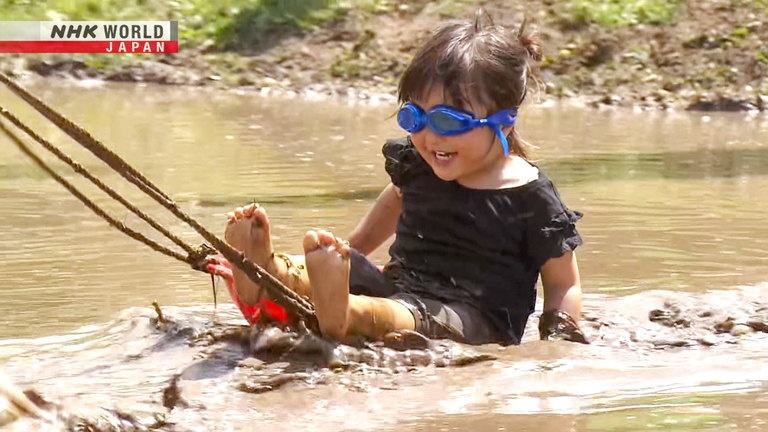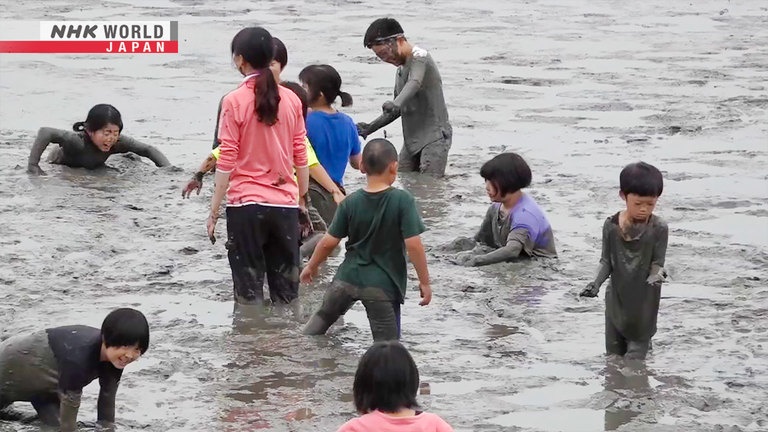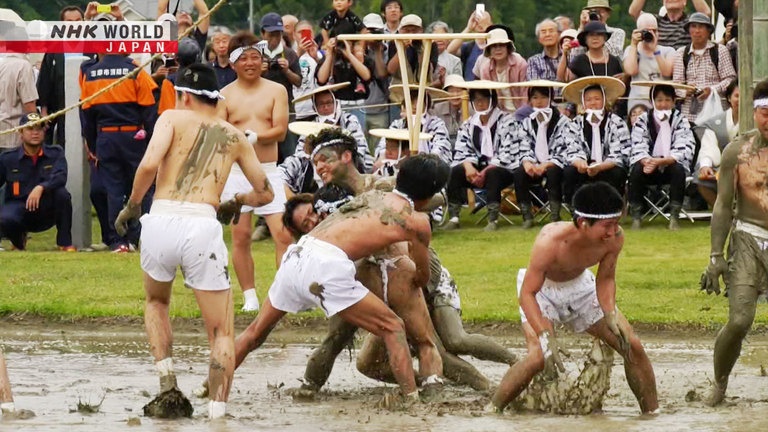Mud
The Japanese language is rich in words and expressions influenced by nature, history and culture. This episode focuses on words related to doro, or mud. Since ancient times, Japanese people have gotten muddy in the rice paddies, cultivating their main staple. Perhaps because of this, there are a surprising number of expressions related to mud in Japanese. And reflecting such a place of hard work, many of them are used in business situations. From his home in Kyoto Prefecture, poet and literary translator Peter MacMillan guides us through unique words born from "mud."




Transcript
"Yukigesyo."
"Karakurenai."
The Japanese language is rich in unique expressions that reflect nature and culture.
Magical Japanese.
Today's theme is "doro," or mud.
Hello, I'm Peter MacMillan.
When I visit farming areas in Japan, I see beautiful countryside all around.
Since the days of old, Japanese people have gotten muddy cultivating their main staple: rice.
Reflecting such a place of hard work, Words related to Mud are often used in Business situations.
"kao ni doro o nuru."
"Kao" is face, and "nuru" means to paint.
The phrase is used figuratively when you unintentionally put someone who's more senior
or of a higher social status in an embarrassing situation.
I've made so many mistakes and lost the trust of my client.
I've "kao ni doro o nuru" - embarrassed - my boss
who taught me the job.
"kao ni doro o nuru."
"kao ni doro o nuru."
If you get mud on your head instead of your face...
"doro o kaburu."
"Kaburu" means to pull something over your head.
So, the phrase means to become completely covered in mud.
It's used when someone voluntarily takes the blame or takes responsibility for a scandal.
Her team didn't perform well,
and she "doro o kaburu" - took the blame - as boss.
"doro o kaburu."
"doro o kaburu."
Someone covered in that much mud would certainly be...
"dorokusai."
"Kusai" means smelly.
"Dorokusai," or smelling of mud, is used to describe an unsophisticated person.
The phrase came about after cities were modernized and paved streets replaced muddy roads.
"dorokusai."
"dorokusai."
These days, to be "dorokusai" or smelling of mud is also used at times as a compliment.
People who show initiative and do the jobs others don't care for, or even notice.
These are the people who are praised as being "dorokusai."
But I think that in Japan especially, we respect people who are "dorokusai."
Now, while adults worked hard in the paddies, for children, mud meant playtime.
"doronko."
This is an informal way of saying something, or someone is covered in mud.
The children are playing while "doronko"
- covered in mud.
"doronko."
"doronko."
In Japan, there is a festival where you get "doronko" muddy and pray to the deities.
"otauesai."
This is a Shinto rice-planting ritual to pray for a good harvest.
It's performed throughout Japan in various local forms.
In Shima City in Mie Prefecture, western Japan, men jump into the rice paddies
and throw mud at each other before doing "dorozumo," or "mud sumo."
Then, they fight for a sacred bamboo pole that is believed to purify the body and the soul.
One phrase coming from competing while being all muddy is:
"dorojiai."
"Jiai" comes from "shiai," meaning a battle or game.
"Dorojiai" refers to a dirty battle involving insults or scandalous attacks between opponents.
In sports, it's used to talk about bad or unruly matches - for example,
when neither side can take the lead, or the players insult each other.
The game dragged on and was full of rough plays.
It was such a "dorojiai" - dirty battle.
"dorojiai."
"dorojiai."
"doronuma ni hamaru."
"Numa" is a swamp, and "hamaru" means to get stuck.
When you're caught in a muddy swamp, it's difficult to move forward.
The phrase is used when someone gets stuck in a difficult situation.
Several members have been injured
and the team is "doronuma ni hamaru" - stuck in a quagmire.
"doronuma ni hamaru."
"doronuma ni hamaru."
There's an ancient Japanese song about getting stuck like this.
"sode nururu kohiji to katsu wa shiri nagara
oritatsu tago no mizukara zo uki."
Just as the farmer knows he'll get dirtied
in the rice paddy field, yet enters still,
because I can't help but love you,
I set off on the road of love
knowing it will end in mud.
This is regarded as the best poem in The Tale of Genji.
"Doro" was originally called "hiji."
The word "hiji" sounds like "kohiji," a term for love.
It came to have a double meaning: "a love like mud."
In the poem the poet compares her inability to escape the trials of love to a mud-covered farmer.
The poem beautifully evokes what it's like to be hopelessly in love.
In ancient times, people in love sometimes suffered if they were of different social ranks.
The following phrase involving mud refers to such an irreconcilable difference, or huge gap.
"undei no sa."
This phrase came from Chinese.
"Un" refers to clouds and "dei" is another reading for "doro."
It describes a huge gap comparable to the difference between sky and earth.
Between the president and us employees,
there is "undei no sa" -a huge gap- in living standards.
"undei no sa."
"undei no sa."
If you play hard in the mud, you get really tired.
I think I'm falling asleep...
"doro no yo ni nemuru."
"Nemuru" means to sleep.
The whole phrase literally means "sleeping like mud," and is used when someone is in a deep slumber.
This phrase is also said to have come from China.
An imaginary water creature was believed to become immobile, like mud, when it emerged from the water.
From this, mud came to be associated with a person sleeping soundly after completing an exhausting task.
After working all day,
Peter will "doro no yo ni nemuru" - sleep like a log - tonight.
"doro no yo ni nemuru."
"doro no yo ni nemuru."
Oh, sorry, I must have fallen a sleep.
How was the episode?
And, do you watch this program?
If you do, it will mean "undei no sa," to your Japanese skills, compared to those who don't watch it.
See you next time.
Bye!